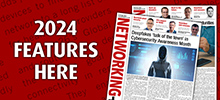01 August 2022
By Mathivanan Venkatachalam, vice president, ManageEngine
Cyberattacks are one of the biggest concerns along with data breaches, spyware, ransomware, and phishing attacks for any organisation today. SMEs are more at risk of cybercrime than enterprises and are inclined to services that maintain compliance and data security.
MSPs strive to maintain a strong security layer around each organisation’s network and be ever ready with reactive measures in case security is compromised. An SME’s ROI from their network security depends on their MSP’s security-focused tools and their customised strategies derived to manage each customer’s network.
To aid MSPs in navigating any potential threats and risks, vendors offer remote monitoring and management (RMM) solutions that prioritise built-in security-centric capabilities, including advanced vulnerability management, browser security management, and application and device security.
Services and products by vendors for MSPs and SME customers
MSPs can provide numerous subscription-based managed IT services to SMEs by leveraging other vendors’ tools built exclusively for MSPs. The MSP toolset includes RMM software, PSA software, antivirus and security software, and recovery and backup software to manage client networks.
Along with these, MSPs can also implement billing software, ITSM software, and password management solutions to help meet the SLAs they’ve committed to for each customer. Security vendors also offer assistance through guidelines and best practices that help MSPs understand the challenges faced by SMEs and better pitch these solutions to them.
Potential shortfalls
For every MSP and vendor, the foremost aspect of providing IT services is customer satisfaction. To maximise customer retention and build trust, MSPs should uphold the privacy of every customer’s data managed within their specific tools. There should be no data overlap between two client networks; MSPs must uphold customers' expectation that the confidentiality of their organisation-centric information will be maintained.
Potential shortfalls for MSPs occur through their choice of MSP solutions. The management tools MSPs utilise must be scalable to accommodate the growing nature of customers' IT networks, and they must provide multi-platform support because each client network has its own function and structure.
How can vendors help MSPs better target SMEs?
MSPs have transitioned from managing a single aspect of a client’s IT network to juggling all the IT management tasks for all their customers’ networks. Due to limited resources, SMEs are looking to outsource their IT to MSPs that can implement a 360-degree approach to gaining visibility into and control over identities, threats, and endpoints. As their responsibilities increase, MSPs are seeking out vendors that offer more capabilities in a single package.
Vendors are working towards creating this all-in-one package for MSPs, with RMM solutions that have built-in ITSM and identity and access management being one example. Developing solutions with tight integrations with other tools is another way that vendors are creating a simplified view of all the capabilities expected to manage SMEs. With such comprehensive tools, MSPs will be able to implement a secure, scalable, and optimised work-from-anywhere model for their customers’ networks.
Providing SME customers with the security services that suit them best
Data privacy and security has gained great momentum across the world in recent years. Government authorities globally are introducing more measures to limit the possibility of data theft. As enterprises adapt to these new regulations and guidelines, SMEs might find it challenging to scale up their IT infrastructure fast enough. This is where MSPs come in by offering solutions that align with regional compliance laws and regulations.
MSPs can offer SMEs security services for protecting their infrastructure—networks, applications, databases, servers, endpoints, and so on. MSPs’ understanding of which solutions in the market are best enables them to increase their clients’ visibility into threats and expedite their security response. Some of the core aspects that require specialised focus include risk assessment and gap analysis; policy development; solution research, requisition, and implementation; management of security systems; reporting; auditing; and compliance.










